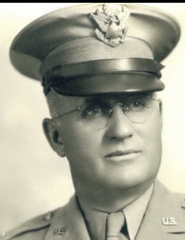Miles Meets Many Iowans on Rome Visit
By FRANK MILES (Iowa Daily Press War Correspondent)
Somewhere in the Mediterranean War Theatre (IDPA) - Believe it or not, I ran across enough Iowa soldiers, sailors and flyers one day in Rome, that if assembled in a group, they could have sung the Tall Corn Song loud
enough to rock that historic city. They had come from places all around - some back from the fronts, others going up. They were roaming about, seeing the sights as uniformed men on leave will, but I didn't see a one a particle out of line. Fact is that, despite the dark talk of some American civilians, all of the service men I have seen over here behave much better than do pleasure-bent youths at home.
The first Iowan I encountered on the way across sat opposite me in the plane we had boarded. After several exchanges of gazes I inquired of the officer with whom he had been talking as to his identity. We had met back in Iowa - 3 or 4 years ago.
He was Lt. Emil A. Fullgrabe of the navy medical corps, who practiced medicine at Indianola before he entered service. The lieutenant served at San Diego, Cal., and Bethesda, Md., before he came over and is now at a North African port, where he is naval sanitation officer. He was bound for Rome as a team physician for navy swimmers in an inter-allied meet held there recently.
On the next plane on which I flew, I met Sgt. Nora Deupree, of Woodbine, who was going to a base in North Africa. She was on her first air trip but took it like a veteran.
Lieut. Jordan Glew, of Dallas Center, an army air corps navigator, I learned, had completed his missions and was awaiting orders to go home for reassignment. His father was the late Dr. P.B. Glew, a veteran of World War I.
At breakfast the day after the allied invasion of Southern France started who should join me but Graham Hovey of Waterloo, formerly on the Courier there, now making a great record as an International News Service war correspondent. Hovey had covered the attack from a tow plane. He has worked with American troops clear through Italy to Florence.
Quite unexpectedly, I ran across Capt. Ann M. McIhenney, a WAC who had been at Fort Des Moines who was the first public relations officer in the U.S. Army, and, who had made scores of addresses before audiences in many cities and towns in Iowa.
She went from Des Moines to Washington and is now stationed in Italy, where she is WAC public relations officer in the Mediterranean theater. The captain hails from Buffalo, N.Y., but says she likes to call herself an adopted daughter of Iowa because the people there treated her so cordially.
Capt. Wells De Young, Des Moines, made himself known to me after he learned who I was from reading my name and organization on my musette bag at Naples. He was on duty in Italy. At the American Red Cross headquarters in Rome, I found registered from Iowa in the state books: Maj. L.W. Butterfield, of Fort Madison, and Lts. Marshall B. Ryder, Oskaloosa; Max L. Rus, Marshalltown; Jesse J. Hurtt, Centerville; Thomas Montgomery, Davenport; Roy J. Hake, Clarion; and Howard A. French, Titonka.
Some American soldiers of Japanese extraction with them with whom I talked lately knew many Iowa officers and men and expressed great admiration for the fighting prowess of Hawkeyes. They profess profound resentment at being called "Japanese-Americans", explaining they do not like the word "Japanese."
I expect to be at their headquarters soon.
Source: Mason City Globe-Gazette, August 31, 1944
![]()

